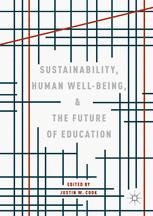How OA books are supporting the SDGs: An interview with Dr Justin Cook
Open access (OA) advances research on the UN’s Sustainable Development Goals - as OA easily connects researchers and their work to policy makers, business leaders, and professionals who can put discoveries into practice. Open access books are easy to find and share, allowing for authors to increase the real-world impact of their work. We invite you to take a closer look and read interviews with OA book authors that illustrate how publishing their books OA has extended their impact and reach. In this interview Dr Justin Cook discusses his experience of publishing an OA book and the impact this has made.
 Could you share a short introduction about your OA book? What were you hoping to achieve with your book?
Could you share a short introduction about your OA book? What were you hoping to achieve with your book?
My book: Sustainability, Human Well-Being, and the Future of Education anticipates radical change in society (such as a future without work) and asks what role education, and more importantly learning, should play in that future
The book originates from a long term strategic focus at the Finnish Innovation Fund (Sitra) on developing and working toward a new societal model organized around sustainable well-being and also includes recommendations for how practitioners, school and system leaders, and communities can carry the work forward
Why did you choose to make your book available on an open access basis?
Our objective was to reach the widest audience possible both in terms of geographic reach and limiting resources needed to access the book. Open access has so far proved to be an excellent tool toward that end.
How was the open access fee (book processing charge) funded?
The book was a project of the Finnish Innovation Fund (Sitra) and the fee was built into our project plan and budgets. As Sitra operates from public funds, we had a duty to find ways to create a public resource and the open access fee was therefore a necessary cost.
Why did you choose to publish this book with Springer/Palgrave Macmillan?
We published with Springer/Palgrave in significant part due to the open access platform and the global reach that would be made possible through the platform.
How were you hoping that open access would help with achieving your goals?
Accessing audiences that we normally do not have access to was critical. While Sitra has a vibrant and well travelled web presence, we know that our core audiences may be looking elsewhere for resources on the topic.
What benefits or impact have you seen from publishing this book open access? Do you think publishing OA helped?
We have seen tremendous engagement with the book that we otherwise likely would not have achieved without open access.
How did you and your co-authors/editors promote the book?
Via our social media channels and through events in the US and Finland.
Do you have any advice to others considering publishing their next book or chapter open access?
No advice other than I would recommend it.
Would you publish open access again?
Yes, certainly.
Learn more about open access books and how they are supporting the SDGs
Justin W. Cook is a strategic designer working on the world’s most challenging problem sets, such as healthcare, sustainability and education. His passion is to tackle these systems challenges by designing innovative organizational architectures. He has worked with many organizations such as the UNDP, IAEA, Special Operations Command, RI National Guard, Harvard, MIT, Johns Hopkins University, Google, IBM, Infosys, and Fidelity Investments. Justin is the Founding Director of the Center for Complexity (CfC) at Rhode Island School of Design, which is a platform for research, experimentation and problem solving at the frontiers of vexing challenges that outmaneuver reductionism. In addition to projects on nuclear weapons, the opioids crisis, the future of food and cities, the CfC is running a professional learning program on strategic design and systems literacy in the US and India. Until 2018, Justin was Senior Lead for strategy at the Finnish Innovation Fund, Sitra, where he spent a decade working to focus Finnish society on greater sustainability and human wellbeing. His portfolio included strategic design, urban systems, decarbonization, impact investing and the future of education. In 2018, Palgrave published his book Sustainability, Human Wellbeing and the Future of Education. While at Sitra, Cook was a founding member of the Helsinki Design Lab. In 2016 he joined the OECD’s Observatory for Public Sector Innovation as an advisor. Justin received a Master of Architecture from Harvard University and Bachelor of Arts from the University of Washington.


